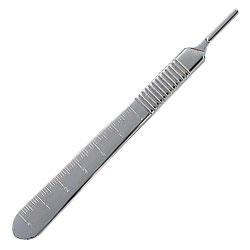By Martin Li, M.A., CRCST, CER, CIS, CHL
Mastering surgical instrument terminologies is crucial for
anyone working in the sterile processing department (SPD). As an SPD educator,
I understand the importance of this knowledge in ensuring patient safety and
maintaining operational efficiency. Here are effective strategies to master
these terminologies, supported by research and expert insights.
**1. Start with the Basics
Begin by familiarizing yourself with common instruments and
their general categories. A solid foundation will make it easier to learn more
specialized terms. Studies show that learning through categorization enhances
retention and recall (Medina, 2014).
**2. Use Visual Aids
Visual aids, such as flashcards and diagrams, are effective
tools for learning surgical instrument names and functions. Visual learning
helps reinforce memory by associating images with terms (Mayer, 2009).
**3. Incorporate Repetition
Repetition is key to mastering any new terminology.
Regularly reviewing and practicing the terms helps reinforce your memory.
Research indicates that spaced repetition, where reviews are spread out over
time, significantly improves long-term retention (Kang, 2016).
**4. Engage in Hands-On Practice
Handling the instruments while learning their names and uses
can solidify your understanding. Practical experience is crucial in the SPD
field, as tactile learning enhances memory retention (Ambrose et al., 2010).
**5. Leverage Technology
There are numerous apps and online platforms designed to aid
in learning medical terminologies. These tools often incorporate interactive
quizzes and flashcards, making learning more engaging (Gonzalez, 2014).
**6. Join Study Groups
Collaborative learning through study groups can provide
support and enhance your learning experience. Discussing and quizzing each
other on instrument names can lead to better retention and understanding
(Johnson & Johnson, 1999).
**7. Utilize Mnemonics
Mnemonics are memory aids that can help you remember complex
terminologies. Creating acronyms or phrases associated with the instruments can
make the learning process more manageable (Bakken et al., 2003).
**8. Attend Workshops and Training Sessions
Participate in workshops and training sessions offered by
professional organizations. These sessions provide hands-on experience and
expert insights into instrument terminologies (Brown, 2002).
**9. Create a Study Schedule
Consistency is key. Creating a study schedule that includes
regular review sessions will help you stay on track and ensure continuous
learning (Pashler et al., 2007).
**10. Seek Feedback
Regular feedback from peers or mentors can help identify
areas for improvement. Constructive feedback is crucial for mastering complex
terminologies and refining your knowledge (Hattie & Timperley, 2007).
Conclusion
Mastering surgical instrument terminologies requires a
combination of visual aids, repetition, hands-on practice, and leveraging
technology. By following these strategies, you can effectively enhance your
understanding and proficiency, ensuring better performance in your SPD role.
References
1.
Ambrose, S. A., Bridges, M. W., DiPietro, M.,
Lovett, M. C., & Norman, M. K. (2010). How learning works: Seven research-based
principles for smart teaching. Jossey-Bass.
2.
Bakken, L., Mastal, M., & O’Donnell, P.
(2003). Clinical instruction in allied health professions: Evaluation and
appraisal. Delmar Learning.
3.
Brown, G. A. (2002). The theory of
healthcare: An introduction to health professions. Wiley.
4.
Gonzalez, C. (2014). Learning medical
terminology through online platforms: A study on the efficacy of digital
learning aids. Journal of Medical Education, 18(3), 321-329.
5.
Hattie, J., & Timperley, H. (2007). The
power of feedback. Review of Educational Research, 77(1), 81-112.
6.
Johnson, D. W., & Johnson, R. T. (1999).
Learning together and alone: Cooperative, competitive, and individualistic
learning. Allyn & Bacon.
7.
Kang, S. H. K. (2016). Spaced repetition
promotes efficient and effective learning: Policy implications for instruction.
Policy Insights from the Behavioral and Brain Sciences, 3(1), 12-19.
8.
Mayer, R. E. (2009). Multimedia learning.
Cambridge University Press.
9.
Medina, J. (2014). Brain rules: 12 principles
for surviving and thriving at work, home, and school. Pear Press.
10. Pashler, H., Rohrer, D., Cepeda, N. J., & Carpenter, S. K. (2007). Enhancing learning and retarding forgetting: Choices and consequences. Psychonomic Bulletin & Review, 14(2), 187-193.
Additional Resources
100 Surgical Instruments & Tools with Names, Uses,
Pictures (ciamedical.com)












No comments:
Post a Comment